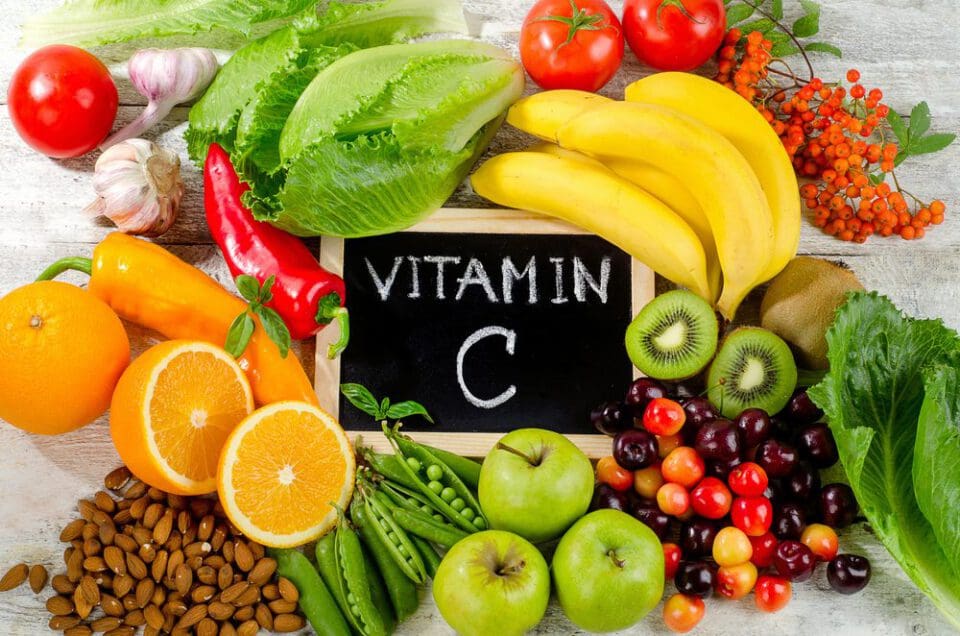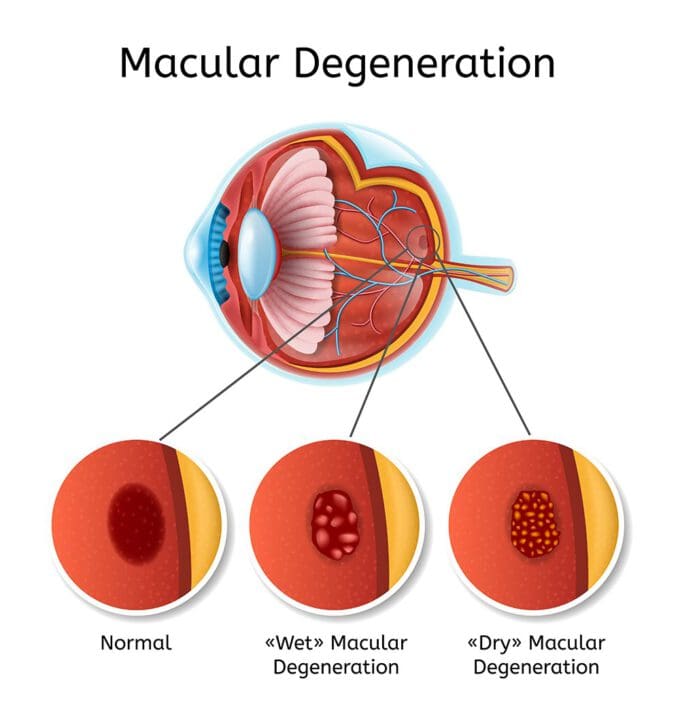Last Updated
How Vitamin C Affects Your Eyesight
Home / How Diet Impacts Eye Health & Vision /
Last Updated
Vitamin C is known for its benefits regarding your immune system. It also plays a role in multiple other body functions and systems, including the eyes, specifically the eye’s blood vessels.
It is a myth that more vitamin C consumption results in better vision. The body secretes the excess, so just aim to hit the recommended amount each day.
Overall, getting enough vitamin C helps to promote greater eye health and overall health. Ensure enough of this nutrient is in your diet, or choose a good supplement.
Vitamin C and Overall Eyesight

Vitamin C also promotes the health of the blood vessels throughout the body, including the retina’s delicate capillaries.
Cataracts
Research shows that vitamin C may help you avoid age-related macular degeneration and cataracts.
One study on vitamin C for cataracts showed that this nutrient may reduce a person’s risk of the progression of their cataracts by a third. In this study, female twins were observed, and there were more than 1,000 pairs of twins. Around age 60, the participants underwent digital imaging to look at their eye lens opacity.
A follow-up was performed 10 years later on 324 pairs of the twins. They also answered a questionnaire regarding their diet and nutrient intake. Researchers concluded vitamin C aided in the slowed progression of cataracts.
The antioxidant properties of vitamin C are believed to be responsible for its ability to inhibit cataract progression. Researchers said that vitamin C may delay the onset of cataracts or at least reduce their progression when they occur. However, it cannot fully prevent you from developing cataracts.
The research into taking this nutrient for cataracts shows that 300 mg daily is the minimum to prevent cataracts. Some studies looked at higher doses.

Macular Degeneration Prevention
There are several nutrients that have been identified as potentially beneficial for age-related macular degeneration, including vitamin E, zeaxanthin, copper, vitamin C, lutein, and zinc.
As for vitamin C, a dosage of 500 mg per day has been studied to reduce the risk of developing age-related macular degeneration. For this condition, it is best to get this nutrient from your diet, but a high-quality supplement can be used as well.
Vitamin C was mostly explored in people who already had macular degeneration. It showed promise in helping to reduce the progression to the later stages of the condition.
Myths About Vitamin C and Eyesight
Vitamin C is water-soluble, so your body excretes excess amounts. It is a common myth that the more vitamin C you ingest, the healthier your eyes will be.
This is not true, as the body tightly regulates how much of this nutrient is present. Taking more vitamin C than you need offers no benefit.
It is also possible to experience health issues with excessive amounts of vitamin C. The following issues may occur:
- Diarrhea
- Vomiting
- Abdominal cramps
- Insomnia
- Nausea
- Heartburn
- Headache
Getting Enough Vitamin C
The human body has no mechanism to manufacture this vitamin on its own. Because of this, you have to get it from your diet or supplementation.

Getting vitamin C from your diet is the best option. Eating a diverse diet is the easiest way to ensure that you get enough of this nutrient as well as other critical nutrients for the eyes. The following foods are high in vitamin C:
- Cantaloupe
- Kiwi
- Papaya
- Berries
- Broccoli
- Spinach and leafy greens
- Cauliflower
- White and sweet potatoes
- Tomatoes
- Citrus fruits
- Mangoes
- Pineapples
- Watermelon
- Red and green peppers
- Brussels sprouts
The amount of vitamin C you need daily depends on your sex. The following are the general guidelines for adults:
- Women: 75 mg per day
- Men: 90 mg per day
- Women who are breastfeeding: 120 mg per day
- Pregnant women: 85 mg per day
If you choose to use a supplement, you should still strive to get enough vitamin C via your diet.
A high-quality multivitamin is a good option because it provides you with vitamin C plus other important nutrients. If you choose to take a supplement, talk to your doctor first. They can provide insight regarding dosage and frequency.
If you supplement with vitamin C, do your homework on the supplement brand. One study showed that many vitamins on the market did not actually contain the dose that the label stated. For example, the label may have outlined 500 mg of vitamin C, but the supplement only actually contained 200 mg. Due to the relaxed regulation of the supplement industry, ask your doctor or pharmacist for brand recommendations.
Talk to your doctor about your diet to determine if you are getting enough vitamin C.
References
- Myths, Artifacts, and Fatal Flaws: Identifying Limitations and Opportunities in Vitamin C Research. (December 2013). Nutrients.
- Is It Possible to Take Too Much Vitamin C? Mayo Clinic.
- Eating Foods High in Vitamin C Cuts Risk of Cataract Progression by a Third. (March 2016). American Academy of Ophthalmology.
- Vitamins for AMD. (May 2018). American Academy of Ophthalmology.
- Vitamins for Age-Related Macular Degeneration: Do You Have the Correct Formula? Bright Focus Foundation.
- Vitamin C. National Institutes of Health Office of Dietary Supplements.
- Vitamin C. MedlinePlus.
The information provided on this page should not be used in place of information provided by a doctor or specialist. To learn more, read our Privacy Policy and Editorial Policy pages.